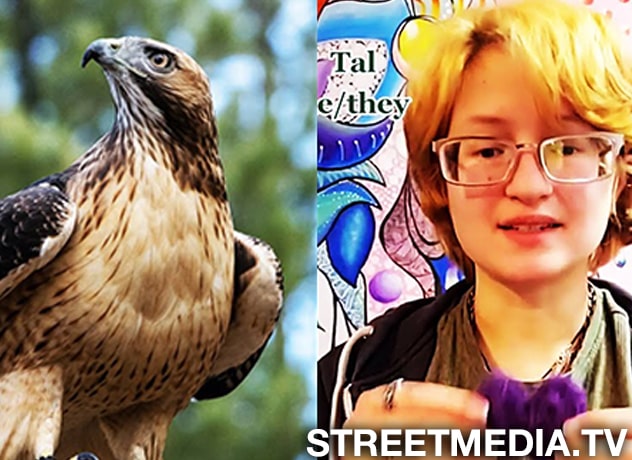From Woke TikToker to Hawk: Examining the Viral Video That Sparked a Conversation About Identity

In recent years, TikTok has emerged as one of the most popular social media platforms among young people. The platform has become a hub for viral trends and challenges, with many users gaining millions of followers and becoming social media stars almost overnight. However, the latest viral trend on TikTok has taken a more unusual turn, with a woke Tiktoker identifies as a hawk, claiming that she legally identifies as a ‘hawk’ living in a human body.
The TikToker, has been posting videos on the platform since early 2021. Her videos typically feature her dancing and lip-syncing to popular songs, but in recent weeks, her content has taken a more bizarre turn. In a video posted on March 1st, she declared that she now legally identifies as a ‘hawk’ and that she is a bird trapped in a human body.
The woke Tiktoker identifies as a hawk video quickly went viral, with millions of people viewing and sharing it on TikTok and other social media platforms. Many people found the video amusing and shared it as a joke, while others were more critical, accusing this Tiktoker of attention-seeking behavior and questioning the legitimacy of her claims.
However, this Tiktoker’s is not the first person to claim that they identify as an animal. The phenomenon of ‘otherkin’ – people who identify as a non-human species – has been around for decades, with many otherkin communities existing online. While the concept may seem strange to many people, it is a deeply held belief for those who identify as otherkin.
This woke Tiktoker identifies as a hawk video has sparked a wider discussion about the validity of otherkin identities and whether they should be recognized by society. Some argue that identifying as an animal is a form of mental illness, while others believe that it is a legitimate form of self-expression and identity.
>> From TikToker to Hawk: How A Woke Tiktoker Identifies As Hawk
Regardless of one’s views on the subject, it is clear that this woke Tiktoker identifies as a hawk video has struck a chord with many young people. The video has spawned numerous memes and remixes, with people creating their own versions of the ‘hawk’ video and sharing them on social media.
The viral nature of this woke Tiktoker identifies as a hawk video raises some interesting questions about the role of social media in shaping our perceptions of identity and self-expression. In a world where anyone can share their thoughts and feelings with the click of a button, how do we define and validate different forms of identity?
Some argue that social media platforms like TikTok have made it easier for people to express themselves in new and unconventional ways. By providing a platform for marginalized communities and alternative forms of self-expression, social media has helped to create a more diverse and inclusive online space.
Others, however, are more skeptical, pointing to the potential dangers of self-expression and identity politics. Critics argue that the rise of identity politics has led to a culture of narcissism and attention-seeking, where individuals are more concerned with their own self-expression than with the needs and concerns of others.
In the case of this woke Tiktoker identifing as a hawk, it is difficult to know whether her claims are genuine or simply a form of attention-seeking. However, her video has opened up an important conversation about the ways in which we define and validate different forms of identity, and the role that social media plays in shaping our perceptions of self-expression and identity.
Ultimately, the debate about this Tiktoker’s viral video raises more questions than it answers. As social media continues to evolve and shape our perceptions of self-expression and identity, it is important that we remain open to new and unconventional forms of self-expression, while also being critical of the potential dangers and pitfalls of identity politics.
Whether or not this Tiktoker’s claims are legitimate, her video has sparked an important conversation about the role of social media in shaping our perceptions of identity and self-expression. It remains to be seen how this conversation will evolve in the coming months and years, but one thing is clear: social media has given rise to new and unconventional forms of self-expression and identity, and it is up to us to navigate this complex landscape with empathy, understanding, and critical thinking.
In conclusion, the viral TikTok of the woke TikToker who now legally identifies as a ‘hawk’ living in a human body has sparked an important conversation about the role of social media in shaping our perceptions of identity and self-expression. While the phenomenon of otherkin may seem strange or even absurd to some, it is a deeply held belief for those who identify as non-human species.
The debate around this Tiktoker’s viral video raises important questions about the legitimacy of otherkin identities, as well as the potential dangers and pitfalls of identity politics. As social media continues to evolve and shape our perceptions of self-expression and identity, it is up to us to remain open to new and unconventional forms of self-expression, while also being critical and discerning in our analysis of these trends.



